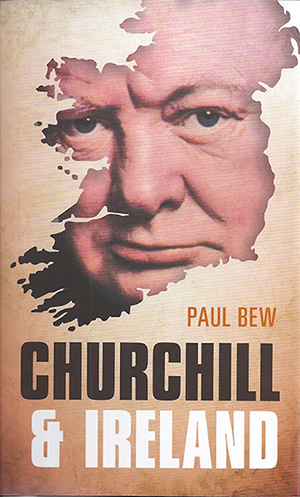Churchill and Ireland
Published in Book Reviews, Issue 4 (July/August 2016), Reviews, Volume 24PAUL BEW
Oxford University Press
£16.99
ISBN 9780198755210
Reviewed by: Martin Mansergh

The problem facing balanced assessment of Churchill’s dealings with Ireland is the weighting to be given to his instinctive belligerence—thankfully not always followed through—versus sugar-coated professions of goodwill towards an ideal Ireland and the loyal fighting Irish. Paul Bew’s case that Churchill was fundamentally a Hibernophile is questionable.
A good test was Churchill’s reaction to the 1948 announcement that the Irish government was to repeal the External Relations Act, declare a republic and leave the Commonwealth. While the prime minister, Attlee,reluctantly decided on damage limitation and no change to the position of the Irish in Britain, Churchill in opposition disassociated himself from this. He had expected that the ‘Southern Irish’ would be confronted with all the difficulties that would arise for the Irish living in Britain, and for defence and trade. He professed no illwill towards the Irish, but went on to argue that Ireland being so close was in an entirely different position from any other British possession.
Thesentimental side probably stemmed from Churchill’s earliest childhood memories of Dublin, when his grandfather, the seventh duke of Marlborough, was lord lieutenant and his father, Lord Randolph Churchill, his political secretary from 1876 to 1880. Among those he remembered was Thomas Burke, permanent under-secretary, assassinated in the Phoenix Park in 1882.The erratic Lord Randolph bequeathed much baggage to his son, who entered politics in 1900 as a Tory initially. Having toyed with Home Rule in 1885to put the Tories back with a majority,once Gladstone adopted it Lord Randolph went to the opposite extreme and famously incited Ulster unionists to militant resistance.
Unsurprisingly,therefore, Winston Churchillreceived a hostile unionist reception when he went to Belfast in 1913 as a Liberal minister advocating Home Rule. Dealing with South Africa had converted him to the advantages of imperial reconciliation, a vision shared by Redmond. In his speech, Churchillexpressed his fundamental belief that separation was ‘absolutely impossible’, the interests of the two islands ‘eternally interwoven’ and the economic dependence of Ireland on Britain ‘absolute’. Sentimentality apart, he viewed Ireland’s proper position, even with autonomy, as an appendage or satellite of Great Britain.
In 1914 Churchill did for once turn his instinctive belligerence on the Ulster unionists. In the most forensic chapter of the book, Bew demonstrates Churchill’s primary responsibility for triggering the ‘Curragh mutiny’, even though others publicly bore the blame for a fiasco that seriously damaged the authority of Asquith’s Liberal government with both unionists and nationalists. Churchill’s view in July 1914 was that Britain should draw the frontierand include certain rural townlands of border counties under Home Rule. With the hindsight of Scottish devolution, Bew expresses doubt about Churchill’s view on the potentially reconciling character of Home Rule.
Employing an Oxbridge academic marking metaphor, Bew acknowledges Churchill’s ability to put in alpha and gamma performances. The disastrous Dardanelles bloodbath of 1915 was in the latter category. In January 1915, when the scale of slaughter on the Western Front was well apparent, Margot Asquith recorded in her diary comments made to her by Churchill:
‘My God!—This is living History. Everything we are doing and saying is thrilling. It will be read by 1,000 generations—think of that!! Why, I would not be out of this glorious, delicious war for anything the world could give me. I say, don’t repeat that I said the word delicious.’
Such sentiments leavebe hind Pearse’s much-denounced extravagant enthusiasm for the heroic defence of their homelands by the Turks and the Belgians. Joan Little wood’s 1963 satirical musical Oh! What a lovely war certainly captured Churchill. Later, as an old, sick man, he did have regrets. He explained to his doctor why his History of the English-speaking peoples ended with the death of Queen Victoria: ‘I could not write about the woe and ruin of the terrible twentieth century. We answered all the tests. But it was useless.’
By far the most contestable part of Bew’s argument is where he awards Churchill an alpha for his role in Ireland in 1920–2. In a way that beats all revisionists, Bew does not explicitly mention the democratic mandate won by Sinn Féin in 1918. Churchill was the most belligerent minister in Lloyd George’s government, sponsoring the Auxiliaries and Black and Tans in the South and the Specials in the North, as well as backing reprisals. In 1922, taking over Irish policy, along with ideologue and adviser Lionel Curtis, he sabotaged attempts to reconcile pro- and anti-Treaty sides and vetoed their draft constitution, effectively making Britain a co-instigator of the Civil War.
Subsequently, to Churchill’s fury, de Valera, whom he had bested in 1922, came back, dismantled the Treaty (excepting partition) and recovered the ports. Churchill never accepted, but refrained from actually violating, Irish neutrality and independence, and tried to squeeze Ireland into submission. He never acknowledged covert Irish co-operation during the Second World War. Ireland and the world benefited from Britain’s holding out against Nazi Germany in 1940–1, which was indeed Churchill’s finest hour, but the political estrangement between Ireland and Britain decades after independence is an unfortunate reverse side of the whole Churchillian legacy, even if that had many contributory causes.The dividing line between academic history and sophisticated political ideology is sometimes a thin one.
Martin Mansergh is vice-chairof the Expert Advisory Groupon Centenaries.
















